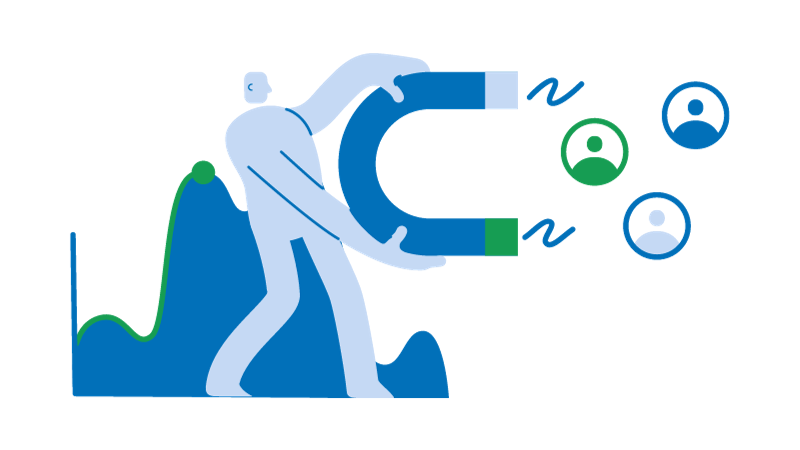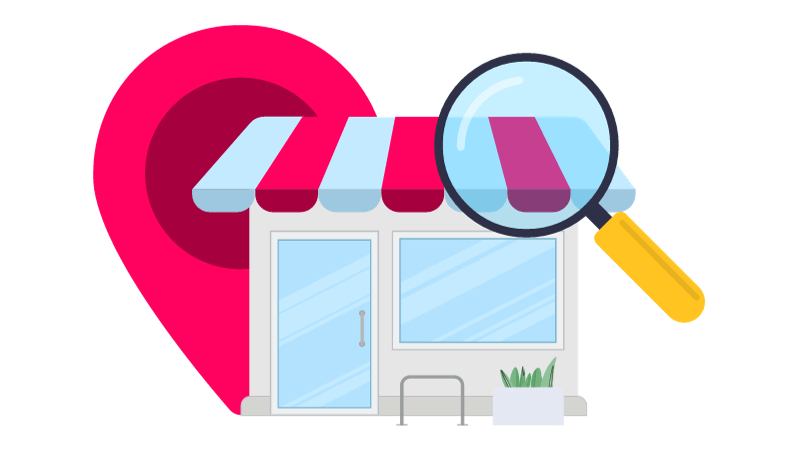If you have a physical store or run a software business and want to reach customers in specific areas, local lead generation can help you grow.
Local lead generation involves connecting with people near your business and targeting them to become potential buyers, also known as leads.
In this blog post, we will talk about how you can use local lead generation strategies to generate leads for your business and the best channels to use.
What is Local Lead Generation?
Local lead generation is when a local business tries to get the attention of potential nearby customers. Now, this attention can be done through offline and even online marketing channels.
Most businesses in 2024, whether physical or online, can use any marketing channel.
For example, A brick motor is not stuck with flyers and posters anymore, they can run Google ads and work on Local SEO for leads.
Similarly, a software company can sponsor relevant local events if the audience fits their ideal customer profile (ICP). Thus helping business owners with wide range of options for local lead generation.
Before we dive more into local lead generation, let’s talk about the benefits of doing local lead generation for your business:-
- Community Engagement:- Because you want to reach people in a specific area, it’s likely they already know each other. Hence, the engagements and interactions in your community will be more.
- Improved Conversion Rates:- When businesses focus on local customers, it helps build trust and relevance. Meeting face-to-face and having convenient access to products and services boosts customer trust. Thus, you can see improved conversion rates with local leads for all those reasons.
- Lesser Competition:- When a business competes globally, sometimes you can’t keep track of its competitors, but when you’re local. You have less competition to beat.
- Worth of Mouth:- As potential customers share the same locality with your existing customers, there is a possibility that word-of-mouth promotion that can increase your leads and sales directly.
9 Best Channels To Start Local Lead Generation

Local lead generation is all about connecting with customers in their own your backyard.
No matter what channels you choose, they will either fall into the category of inbound marketing v/s outbound marketing.
Here are the best channels to kickstart your local campaigns:-
1. Local SEO
This is your bread and butter for getting noticed in local searches. Whenever someone types ‘Best cafe near me’ or ‘Best auto repair shop near me’, you want to show up in the search results if it’s relevant to your business. Since local SEO is cost-effective and works in specific areas, Local SEO should be at the top of your list when choosing a channel for local lead generation.
To start, you need a Google My Business listing with your business details, photos, and reviews from your existing customers.
You can hone in on this channel by optimizing your lead gen website with local search keywords, ensuring your Google My Business listing is up to date, and getting listed in local directories. It’s all about ensuring that when someone searches for your type of business in your area, you’re on the top, if not top 3.
2. PPC Ads
Pay-per-click ads, aka Google ads, can be a game-changer. You can target specific locations, ensuring your ads are seen by people in your specific location.
If people are searching on search engines for something about a product (or) service, it is more likely that they are looking to purchase. Hence, Google ads are a great way to get in front of potential customers who are actively searching for what you offer. Also it helps you by-pass the organic search results.
Unlike Local SEO, Google Ads can help you generate leads faster. If you’re starting new and want to compete with other businesses with strong local SEO. Then start paying for ads is great channel for lead generation. Hence, if you have the budget, investing in Google ads is worth a try for your business.
3. Meta Ads
Just like Google ads, Facebook and Instagram paid ads allow you to target specific demographics within your local area. The only thing here is that, unlike Google, people don’t search for your product (or) there to buy anything on social media.
Hence, it would help to tailor your ads based on interests, behaviors, age, and more, ensuring your message reaches the right local audience.
However using paid channels like ads, you get to focus on ROI and keep track of your new customers through this channel. It only makes sense if you have positive ROI for your ads as a local business owners.
4. Cold Emails
This might seem a bit old school, but targeted cold emails can be effective. The key is personalization and relevance. Make sure you’re reaching out to people who are likely to be interested in what you offer and provide them with real value in your message.
5. Direct Mailing
In the digital age, a well-crafted direct mail piece can still have a big impact. It’s tangible and can stand out in a pile of bills and junk mail. Tailor your message to the local community and offer something that grabs attention.
6. SMS Marketing
Text messages have a high open rate. Use SMS marketing to send out special offers, updates, or reminders to a local audience. It’s direct, personal, and can drive quick responses.
Tip:- Cold calling your SMS prospects as a follow-up to your text messages generates better responses for your campaigns.
7. Social Media Outreach
Engage with your local community on social media platforms. Share local news, participate in community discussions, and know local trends. It’s about building relationships and staying top of mind.
Know where your audience is on social media. Is it Facebook? Is it Instagram? Is it LinkedIn?
Go to those specific platforms, create content, build an audience, and pitch your products and services via outreach.
8. Use Local Forums
Platforms like Nextdoor or local Facebook groups can be goldmines for connecting with your community.
Participate in discussions, offer advice, and gently promote your business when appropriate.
9. Local Events
Participating in or sponsoring local events can put your business in front of a potential local audience. Use your banners and flyers to spread the word about your business by being face-to-face with your community
It’s a great way to build brand awareness and connect with potential customers.
In this local event, offer them free samples of your products (or) offer a free consultation of your service for interested leads.
Each channel has its strengths and can be effective in different ways. The key is understanding your local market and effectively tailoring your approach to connect with your community.
By diversifying your local lead generation efforts across these channels, you can build a robust strategy that captures the attention of your local audience and turns them into loyal customers.
How To Start Local Lead Generation For Your Business?

To start a lead generation campaign for your local business there are a lot of things that you need to factor like how to do the ground work to reach customers, and what channels you’re leveraging to generate leads for your business.
However, that being said, it only seems a viable option to generate leads locally if the business is operating offline (or) if your an online business running location-specific marketing campaigns.
Whichever the case may be, these are the steps that we think would help you get a head start while doing local lead generation:-
1) Laws to consider while doing lead generation
It’s imperative to be aware of laws like the CCPA, CAN-SPAM Act, CASL, and GDPR to ensure compliance and avoid legal issues.
Although some of the laws might not apply while you’re leveraging lead generation business model for some location, however it’s best to ensure you’re not violating any.
Some of the underlying laws and regulations you need to keep in mind:-
1. California’s Privacy Law (CCPA):- Have a customer base in California? If you’re using customer data in your marketing campaigns, you need to be straight about their info. In the case of email outreach, you need to provide clear opt-out options.
2. The CAN-SPAM Act:- All over the U.S., if you’re sending out promotional emails and SMS, you’ve got to be honest about who you are. No sneaky stuff with fake email addresses or misleading subject lines.
3. Canada’s Anti-Spam Law (CASL):- In Canada, you must get a clear yes from people before you send them your outreach messages. In these messages, let them know who you are and make it easy for them to opt-out.
4. Europe’s Data Protection Law (GDPR):- There’s a whole set of rules about protecting personal data in Europe. In recent years, companies like Facebook and Google had to bend their rules for privacy. Make sure you got the individual’s permission to use their data, you’ve got to keep it safe, and you should be ready to delete it if they ask.
5. Singapore’s Personal Data Protection Act (PDPA):- Over in Singapore, they have rules to ensure businesses handle personal data like precious cargo. People should know what you’re doing with their information, you can’t use it without their permission. If someone wants their details to be taken off, you’ve got to have the eraser ready.
Whichever your lead generation strategy maybe, if you’re showing your customers who you are and not manipulating anything with your messages and making it easy for them to opt out of your messages, then you’re good to go. Each region has specific privacy rules, before doing local lead generation, ensure your processes and strategies doesn’t interfere with any of these rules and regulations.
2) Know your Audience
For a small business, even though you might feel targeting the overall population in your location you should know that marketing to everyone is marketing to no one, even if it’s done for a specific region.
Within the region where you operate, you need to know your specific set of audiences, who are your potential buyers, and who will keep coming back to buy products and services from you.
Here are the three steps that you can follow to know your audience:-
- Research your business and competitors:- Understand the challenges of selling your products and services in a specific locations. Know what the people in that location are already buying. Know your competitors and reverse engineer to look into their lead generation traffic sources to understand how you can do the same in a better way.
- Sort out a target audience base specifically and locally:- Use demographic attributes such as age, gender, location, and occupation to sort out your specific audience sets. Also, using firmographic attributes such as company size, industry, revenue, and job titles of decision-makers within the organization helps.
- Build Ideal Customer Profile (ICP):- Now, create profiles based on your specific set of audiences, and each ideal customer profile will be marketed differently to convert more qualified leads into potential buyers for your business.
3) Select a target offer and a lead magnet
Selecting your target offer and lead magnet is like setting the perfect trap for your ideal customer – but in the nicest way possible.
However, it’s not about enticing people with offers that you cannot deliver because when it comes to local buyers, once you lose the trust of two or three buyers, the word spreads around soon, and you will be short of business.
Thus, to reach your audience in the right way and entice them into buying from you is an art, where you craft suitable target offers along with lead magnets:-
- Lead Magnets:- For online businesses, generally, lead magnets are nothing but giving away e-books, offering free consultation, and something of that sort. For an offline small business, a lead magnet should be something like giving free samples of your products, giving away gift cards for your store (or) free consultation before buying your service. It’s important that these lead gen lead magnets should scream “local” and “beneficial
- Target Offer:- Crafting an offer for your product and having competitive pricing depends on the research you did to know your audience. Your target offers should aim to get as many people as possible to visit your store (or) check out your products.
Selecting your target offer and having a lead magnet is all about understanding and providing value to your local community, If you’re good at both of these, you’ll build a community of loyal customers who feel seen, heard, and valued.
3) Choose your platforms to start
Weather you’re an offline business (or) an online business, for each business, choosing the right platforms to do lead gen will be different.
I guess with the plethora of options that we have today when it comes to selecting platforms for local lead gen makes us dizzy in a sense.
To keep it simple:-
- If you’re an online business:- Leverage channels like Local SEO, PPC Ads, Meta Ads, Cold Outreach
- If you’re an offline business:- Leverage the above channels that an online business does along with that go for trade shows, local events, and other community gatherings
4) Choose your tools to start
Now, selecting the tools for your lead gen depends on the platforms and the methods you’re trying to generate leads. Hence, for each strategy, there are different tools in the mix.
Anyhow, here’s a list of essential online tools that can significantly enhance your local lead generation efforts:-
1. Google My Business:- This free tool is vital for managing your online presence on Google, including Search engine and Maps. It helps you control how your business appears and performs in when a potential customer searches.
2. SEO Tools (e.g., Moz Local, SEMrush, Ahrefs):- If you want to leverage your website and generate traffic through search engine optimization. SEO tools can help in keyword research, tracking search rankings, analyzing backlinks, and identifying SEO opportunities specific to your local area.
3. Customer Relationship Management (CRM) Software (e.g., HubSpot, Salesforce):- CRM systems help manage interactions with potential and current customers, track leads, and streamline sales.
4. Social Media Management Tools (e.g., Hootsuite, Buffer):- These tools are excellent for managing and scheduling posts across multiple social media platforms, engaging with your audience, and analyzing social media performance.
5. Email Marketing Software (e.g., Mailchimp, Constant Contact):- Email marketing tools helps businesses with creating, sending, and tracking email campaigns, which is an essential part of nurturing leads.
6. Online Reputation Management Tools (e.g., Reputation. com, Podium):- These tools help monitor and manage what’s being said about your business online (including Google reviews), allowing you to respond appropriately and maintain a positive reputation.
7. Local Listing Management Tools (e.g., BrightLocal, Yext):- These services ensure your business information is consistent and accurate across various online directories and listing sites.
8. Google Analytics:- Essential for tracking website traffic, user behavior, and conversion metrics, helping you understand how visitors interact with your website.
9. Lead Capture Tools (e.g., OptinMonster, Unbounce):- These tools help you create effective landing pages and opt-in forms to capture leads.
10. Lead Management tools (e.g:- LeadBoxer, and GoHighLevel):- When you’re doing cold outreach for your local business, may it be through cold email (or) SMS marketing, having tools to assess and manage those leads is essential. Most importantly, these tools can sync with your existing CRM or be the one for your business.
10. Paid Advertising Tools (e.g., Google Ads, Facebook Ads Manager):- These platforms are indispensable for running targeted local ads. They allow you to reach a specific audience based on location, interests, and more.
11. Chatbots and Live Chat Software (e.g., Intercom, Drift):- These tools can enhance customer engagement on your website, providing instant assistance and capturing lead information.
12. Call Tracking Software (e.g., CallRail, DialogTech):- If phone calls and cold calling are a significant part of your business, these tools can track the source of calls and measure the effectiveness of your marketing efforts.
Each of these tools plays a specific role in the local lead generation process, and when used effectively, they can significantly boost your ability to attract and convert local leads.
However, each tool has its use cases, and as a business, you can’t incorporate every tool for marketing. Depending on your marketing channels, customer personas, budget, and your goals, the tools can be helpful for your marketing campaigns.
Wrap Up
Local lead generation is an essential strategy for location-dependent businesses that run offline stores where people walk through their doors.
The key to growing your business through local lead generation is all about knowing your audience and competitors, then crafting good offers, and using the right marketing channels for leads.
If you’re marketing campaign are generating your local leads at scale, try using a tool like LeadBoxer. We use Lead Scoring as a metric to precisely know which of your existing prospects have the potential to become Sales Qualified Leads (SQLs), leads who are more ready to buy from you.
